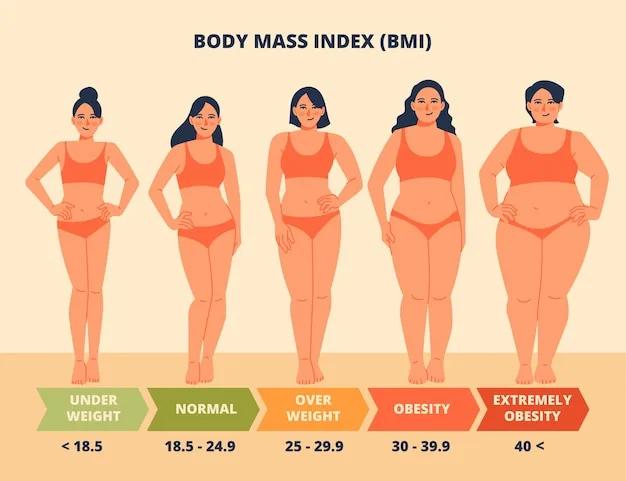

Image source: Canva
According to the Centers for Disease Control and Prevention (CDC), approximately one-third of Americans are obese and inactivity is an important part of weight gain. The role of physical activity is a crucial component of a healthy lifestyle, contributing to a healthy BMI (body mass index), weight loss, body fat reduction, cardiovascular health and overall well-being.
Many people wonder how much exercise is needed to achieve their goals. Incorporating regular exercise into our daily routines is not only beneficial for weight control, but also plays a significant role in preventing chronic diseases such as heart disease, stroke, and diabetes. In this article, we will explore the recommended levels of physical activity for different age groups and the associated health benefits.
Physical activity guidelines for different age groups
Infants and toddlers (under 5 years of age)
For infants and toddlers, physical activity is essential for their growth and development. According to the World Health Organization (WHO) exercise recommendations, infants should engage in interactive floor-based play several times daily, including at least 30 minutes of tummy time for those not yet mobile. Restraining infants for more than 1 hour at a time is discouraged. Screen time is also not recommended for this age group, and they should have adequate sleep.
Children (5-17 years of age)
Children and adolescents should aim for at least 60 minutes of moderate-to-high intensity exercise every day. This can include activities such as walking, cycling, sports, and active play. They should also incorporate muscle-strengthening and bone-strengthening activities at least three days a week. Limiting sedentary behavior in leisure time, especially screen time, is crucial for this age group.
Adults (18-64 years of age)
For adults, the American College of Sports Medicine (ACSM) recommends at least 150-300 minutes of moderate-intensity aerobic activity or 75-150 minutes of vigorous physical activity per week. Additionally, muscle-strengthening activities that target major muscle groups should be performed at least two days a week. It is also important to limit sedentary behavior and replace it with a greater amount of physical activity whenever possible. This will contribute to daily energy expenditure which can help stay in energy balance or even lose weight.
Older Adults (65 years and above)
Older adults should follow similar guidelines as adults, aiming for at least 150-300 minutes of moderate-intensity aerobic activity or 75-150 minutes of vigorous-intensity activity per week. They should also incorporate balance and strength training exercises at least three days a week to enhance functional capacity and prevent falls.
Pregnant and postpartum women
Physical activity is beneficial for pregnant and postpartum women, provided there are no contraindications. They should aim for at least 150 minutes of moderate-intensity activity throughout the week, incorporating various exercises that target both aerobic fitness and muscle strengthening. Sedentary behavior should be limited for optimal health.
People with chronic conditions
Individuals with chronic conditions such as hypertension, type 2 diabetes, HIV, and cancer survivors can also benefit from regular physical activity. The recommended guidelines include at least 150-300 minutes of moderate-intensity aerobic activity or 75-150 minutes of vigorous-intensity aerobic activity per week, along with muscle-strengthening exercises targeting major muscle groups.
The benefits of physical activity
Regular physical activity offers a wide range of benefits for individuals of all ages. Here are some of the key advantages associated with incorporating exercise into your daily routine:
Weight management
Physical activity plays a crucial role in body weight management. Regular exercise helps burn calories, increase metabolism, build lean muscle mass and maintain a healthy weight. Combined with a healthy diet, physical activity can contribute to weight loss and prevent weight gain.
Cardiovascular health
Regular physical activity strengthens the heart, elevates heart rate and improves cardiovascular health. It helps lower blood pressure, reduce the risk factors of heart disease and stroke, and improve overall cardiovascular fitness. Aerobic exercises such as brisk walking, running, swimming, and cycling are particularly effective in promoting heart health.
Prevention of chronic diseases
Studies have shown that regular physical activity can help prevent and manage chronic diseases such as type 2 diabetes, certain types of cancer, and osteoporosis. Exercise improves insulin sensitivity, reduces inflammation, and enhances immune function, thereby reducing the risk of these conditions.
Mental health and well-being
Physical activity has a positive impact on mental health and well-being. Exercise releases endorphins, the “feel-good” hormones, which can help reduce symptoms of depression, anxiety, and stress. Regular physical activity also promotes better sleep, boosts self-esteem, and improves overall quality of life.
Bone health
Weight-bearing exercises, such as walking, jogging, and weightlifting, are essential for maintaining strong and healthy bones. Physical activity helps increase bone density, reducing the risk of osteoporosis and fractures, especially in older adults.
Improved cognitive function
Engaging in regular physical activity has been linked to improved cognitive function and brain health. Exercise increases blood flow to the brain, promotes the growth of new neurons, and enhances memory, attention, and problem-solving skills.
Balancing physical activity and sedentary behavior
While physical activity is crucial for overall health, it is equally important to reduce sedentary behavior. Prolonged periods of sitting or inactivity have been associated with numerous health risks, including obesity, cardiovascular disease, and metabolic disorders. It is recommended to break up long periods of sitting with short bouts of physical activity, such as stretching, walking, or light exercises.
Conclusion
Physical activity is a fundamental component of a healthy lifestyle, and weight maintenance and offers numerous benefits for individuals of all ages. Incorporating regular exercise into our daily routines not only helps with weight management but also improves cardiovascular health, prevents chronic diseases, enhances mental well-being, and promotes overall quality of life. Engaging in moderate-intensity activities, such as brisk walking, jogging or cycling can improve body composition, by decreasing fat mass and increasing lean muscle mass, both of which contribute to lower BMI scores. By following the recommended physical activity guidelines for different age groups, we can reap the rewards of a physically active lifestyle and enjoy a healthier, happier life. In conclusion, while there are general guidelines on how much physical activity we should aim for each week, it ultimately boils down to finding a routine that works best for you.
Remember, always consult with a healthcare professional before starting any exercise program, especially if you have underlying health conditions or are pregnant.
Sources
- How much physical activity is needed for weight loss, weight loss maintenance, and weight gain prevention? – Obesity Medicine Association
- Doctors Hanbook_ch10.pdf
- Physical activity – WHO
Medical Disclaimer
NowPatient has taken all reasonable steps to ensure that all material is factually accurate, complete, and current. However, the knowledge and experience of a qualified healthcare professional should always be sought after instead of using the information on this page. Before taking any drug, you should always speak to your doctor or another qualified healthcare provider.
The information provided here about medications is subject to change and is not meant to include all uses, precautions, warnings, directions, drug interactions, allergic reactions, or negative effects. The absence of warnings or other information for a particular medication does not imply that the medication or medication combination is appropriate for all patients or for all possible purposes.









